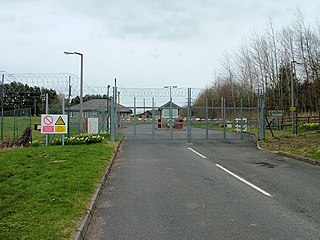See also
- Holystone Slope, a glacier in Antarctica
Holystone is a sandstone used for scrubbing and whitening the wooden decks of ships.
Holystone may also refer to:
Rock most often refers to:

The A48 is a trunk road in Great Britain running from the A40 at Highnam, 3 miles (4.8 km) west of Gloucester, England, to the A40 at Carmarthen, Wales. Before the Severn Bridge opened on 8 September 1966, it was a major route between England and South Wales. For most of its route, it runs almost parallel to the M4 motorway. During times of high winds at the Severn Bridge, the A48 is used as part of the diversion route and is still marked as a Holiday Route.

The River Coquet runs through the county of Northumberland, England, discharging into the North Sea on the east coast at Amble. It rises in the Cheviot Hills on the border between England and Scotland, and follows a winding course across the landscape ("Coquetdale"). The upper reaches are bordered by the Otterburn Ranges military training ground, and are crossed by a number of bridges built in the 20th century. It passes a number of small villages and hamlets, and feeds one of the lakes created by extraction of gravel that form the Caistron Nature Reserve, before reaching the town of Rothbury, where it is crossed by a grade II listed bridge. Below the town is Thrum Mill, the restoration of which was featured on Channel 4 television.
Kirby may refer to:

St Helens is a village and civil parish located on the eastern side of the Isle of Wight.

Palmersville is a Tyne and Wear Metro station, serving the village of Holystone and suburb of Forest Hall, North Tyneside in Tyne and Wear, England. It joined the network on 19 March 1986.

Holystone is a soft and brittle sandstone that was formerly used in the Royal Navy and US Navy for scrubbing and whitening the wooden decks of ships.

Holystone is a small village and former civil parish, now in the parish of Harbottle, in Northumberland, England. It lies on the edge of the Northumberland National Park on the north bank of the River Coquet. A significant landmark is Holy Well, traditionally the site of early Christian baptisms, and the source of Holystone's water supply. In 1951 the parish had a population of 71.
Sandhurst often refers to:
Elections to North Tyneside Metropolitan Council took place on 10 June 2004; the same day as other local council elections in England, along with European elections and London mayoral and Assembly elections.
Major Gustav Adolph Renwick (1883–1956) was a British industrialist, greyhound and racehorse owner and Conservative politician.

Hepple is a small village and parish in rural Northumberland, 4 miles (6.4 km) west of Rothbury, which provides most of its local services. It is on the edge of the Northumberland National Park, and lies on the bank of the river Coquet, at a location which was on the Coquet Stop Line, of which a pillbox remains. It is on the road between Rothbury and Otterburn. The village contains a church, village hall and post office.

The Otterburn Army Training Estate (ATE) is a military training area near Otterburn, Northumberland, in northern England. It is owned by the UK's Ministry of Defence (MoD) and operated by Landmarc on contract from the MoD's Defence Infrastructure Organisation. The range is used for training up to 30,000 soldiers per year. The site was established in 1911 and covers about 242 square kilometres (93 sq mi) of the southern Cheviot Hills, 23% of the Northumberland National Park.
Lady's Well or Our Lady's Well is a common name in the United Kingdom and Ireland for a holy well, usually dedicated to the Virgin Mary.

Holystone is a village in North Tyneside. It is situated to the southwest of Whitley Bay, just off the A19.